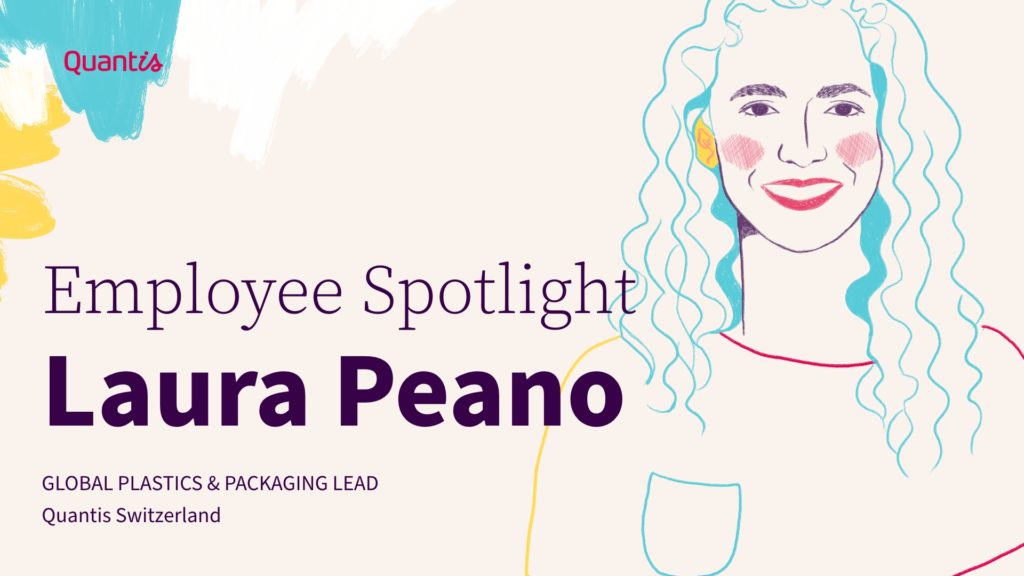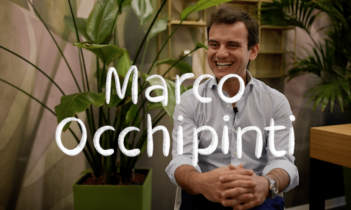
Laura Peano is Quantis's global plastics lead, based in our Zurich, Switzerland office. A Quantisian for over a decade, Laura tells us about her role, what an average day looks like and how her team is contributing to a sustainable future.
How did you start out at Quantis, and what do you do today?
Laura Peano: I started at Quantis in 2009, so it’s been a long journey. It was not even Quantis at the time, it was Ecointesys. I started as an LCA analyst, but I was also involved in project management and was able to work on a lot of different projects which allowed me to explore my interests.
One day, someone asked if I would like to work on a plastics project. I didn’t know a lot about the subject at the time, but I thought, “Why not?” I then started working solely on plastic packaging, plastic pollution and projects related to plastic. I became really passionate about this topic, and after 13 years at Quantis, I’m now the global plastics lead.
What has kept you here at Quantis?
LP: The people I’m working with. I’ve met amazing colleagues who believe in what they do and willing to learn day by day, available to help and committed. Many of them are more than colleagues, they’re friends.
How are you and your team contributing to sustainable business transformation?
LP: The plastic team helps our clients decrease the impacts of their products and packaging.
The main questions that we receive from our clients are, “How can we stop using plastic? Should we be doing this? How can you help us?” The goal is to work with our clients to reduce their plastic use while avoiding trade-offs. We don’t want to unintentionally increase their carbon footprint while decreasing their plastic use, for example.
We have always had a holistic review of impacts, and we try to find the most “environmentally friendly” materials in the country where a company sells its products. Of course, there are many factors to consider, but I always say that the ultimate goal is not just to avoid using plastic but to use the best materials for your purpose.
For example, there’s a big trend around bioplastics, but they are not always the best option. Our goal is to make our clients aware that just because “bio” is in the name and they seem “green,” it’s not always the best material for their company. In some cases, bioplastics can be even more impactful than regular plastic. In particular, bioplastics can have an impact on biodiversity and nature because they sometimes rely on crops such as corn and sugarcane.
What does your average day look like?
LP: What I like about Quantis is that every day is different. I could not do the same thing every day. Typically though, I support our strategists in selling projects and the operational teams in delivering projects. I spend most of my time brainstorming with strategists about how to answer clients’ questions or helping the project team figure out how to solve client issues. I’m always strategizing about ways for us to be more efficient and I often speak directly with clients to better understand their needs.
I spend a lot of my time talking with people. Sometimes, at the end of the day, I realize that I have been talking for eight hours, jumping from one project to another. I like being able to hop from topic to topic, helping my colleagues and supporting them.
What’s the most unexpected opportunity you’ve found at Quantis?
LP: Honestly, it’s the fact that I’m seen as an expert on plastic and packaging — I never expected that to happen. When I started at Quantis, I was very focused on crops, such as coffee, and business development. When you work on food projects, the focus is rarely on packaging; you’re typically focusing on crops.
But I remember when I discovered that most of our packaging is not recyclable — which was a huge surprise — it made me realize that I wanted to dig deeper into this topic because of its complexity.
If you could share a piece of professional or personal advice with your younger self, what would it be and why?
LP: I would say to have confidence in myself — to believe that you can do what you set your mind to.
At the beginning of my career , it was very common to participate in meetings where I was the only woman. No one really wanted to listen to me because they thought that I didn’t have enough expertise. It’s difficult to lead meetings when you’re not only a woman, but also the youngest in the room. In the beginning, I thought that maybe I shouldn’t be in that room because I wasn’t the right person to tell them what they should do. Fifteen years later, I know that I’m the right person to be in that room, that I’m an expert.
Believe that everything is possible if you are really passionate about what you do.
Be curious. Never stop learning. This is what allows us to best help and support our clients.
Want your next career move to be with a growing international team, helping top organizations make the shift from business as usual to business at its best? Let’s talk!
Latest talent resources

A conversation with Sara Traubel
Meet Sara Traubel, a senior sustainability consultant from Quantis Switzerland!

A conversation with Marco Occhipinti
Meet Marco Occhipinti, a senior strategist from Quantis Italy!

A conversation with Alessio Aufoujal
Meet Alessio Aufoujal, a sustainability analyst in Quantis's Paris office!
